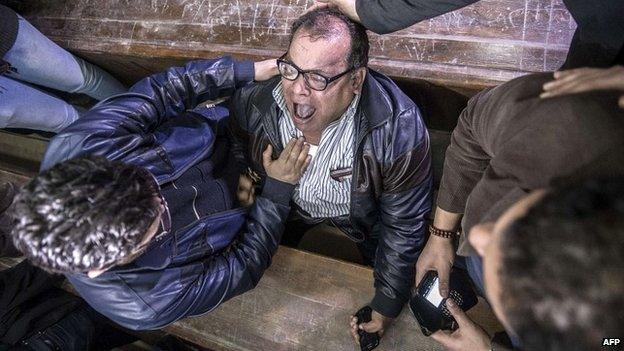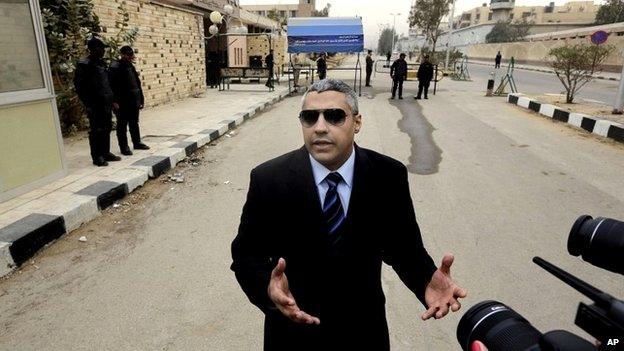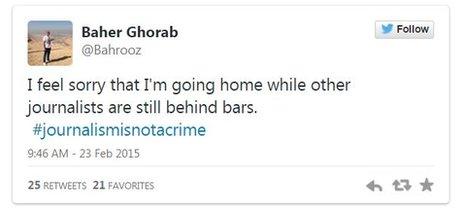Alaa Abdel Fattah: Egypt jails activist-blogger for five years
- Published
Human rights campaigners say there is less freedom here now, than before the revolution
An Egyptian court has jailed prominent blogger and pro-democracy activist Alaa Abdel Fattah for five years at his retrial for violating a protest law.
He is accused of organising a demonstration in 2013 and was previously given a 15-year jail term.
Mr Abdel Fattah gained fame during the 2011 uprising as a campaigner against military trials for civilians.
Al-Jazeera journalists Mohamed Fahmy and Baher Mohamed also appeared in the same court on Monday for their retrial.
The men were freed on bail earlier this month after more than a year behind bars.
The retrial was adjourned after a brief hearing, and they are next due in court on 8 March.
The journalists are accused of spreading false information and of helping the banned Muslim Brotherhood organisation.
Australian Peter Greste, the third journalist in the case, was freed on 1 February and deported to Australia.
Court uproar
Mr Abdel Fattah was a leading secular figure in the 2011 revolt that toppled Hosni Mubarak, who had ruled Egypt for almost 30 years.
The blogger and software engineer was once described by authorities as "the icon of the revolution".
He campaigned against military trials for civilians during the 17 months that generals held power after Mr Mubarak.
Mr Abdel Fattah also opposed Muslim Brotherhood leader Mohamed Morsi and is one of several well-known activists to have been jailed since the army ousted him from power in 2013.
The charges against Mr Abdel Fattah include organising an illegal protest and assaulting a policeman.
They stem largely from a law prohibiting protests in Egypt without prior government permission, a measure that came after Mr Morsi was overthrown.

At the scene: Orla Guerin, BBC News, Cairo

After the verdicts were announced, anger erupted in court. Relatives of the accused began chanting "down, down with military rule".
Some stood on the benches trying to shout messages to their loved ones inside the virtually soundproof cages. Others showed their support with a round of applause for the defendants.
Several parents were overcome. "This is shameful," one father cried, beating his chest in distress.
"My son is brave," he said repeatedly before he was helped away.
The liberal politician Khaled Dawoud, from the al-Dustour Party, wept at the back of the court, as he embraced some of the relatives. He said Egypt was locking up its young just for taking part in peaceful protests.
"There is no democracy here," he said.
Mr Abdul Fattah's aunt, the renowned Egyptian novelist Ahdaf Soueif, was in court for the verdict. She said there is less freedom in Egypt now than under the deposed autocrat Hosni Mubarak.

Rights groups say the case is politically motivated and forms part of a broader crackdown on dissent under President Abdel Fattah al-Sisi, a former army chief.
Other defendants on trial with Mr Abdel Fattah received sentences ranging from three to 15 years.
Defence lawyers said they would appeal against the ruling.
Mr Abdel Fattah previously said the trial was a farce. He has been on a hunger strike.

Journalist Mohamed Fahmy and his colleague Baher Mohamed are due back in court in March
Rights groups have also criticised the case against the al-Jazeera journalists, describing it as an assault on press freedom.
At their original trial, Mr Greste and Mr Fahmy were sentenced to seven years in prison. Mr Mohamed received an additional three-year sentence on a separate charge involving possession of weapons.
The defendants denied the charges, describing their trial as a sham.
Their convictions were overturned on 1 January, when the courts ordered a retrial. Exactly one month later, Mr Greste was released and deported to Australia.
Several students have also been held in the same case. The students deny working for al-Jazeera but it is thought that material filmed on their phones was used by the network.
After his retrial was adjourned, Mr Mohamed tweeted that he was concerned for the others still being held.
